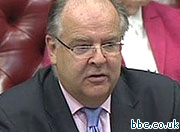Lord Falconer’s controversial assisted suicide Bill has been labelled “wholly inadequate” and “not fit for purpose” by an expert end-of-life think tank.
The Living and Dying Well group has published a comprehensive report which says the new assisted suicide Bill contains no safeguards for assessing assisted suicide requests.
The report was jointly authored by lawyers, doctors and disabled peoples’ advocates.
Intent
It points out that the legislation relies on codes of practice on mental capacity and intent being drawn up after assisted suicide is made law.
The report said: “Parliament cannot responsibly be asked to approve such a radical piece of legislation without seeing the nature of the safeguards that would accompany it”.
Lord Falconer’s “Assisted Dying” Bill would allow doctors to give lethal drugs to patients who are believed to have less than six months to live.
Ignore
The Living and Dying Well group’s report highlights the way the Bill has ignored medical evidence about how unreliable the prognoses for terminal illnesses are, yet places responsibility for assessing assisted suicide requests with the medical profession.
It says the proposals fail the public safety test by a “considerable margin’.
The report concludes that we can already “deal with exceptional cases in an exceptional way” under the current law.
Opposition
Meanwhile the Royal College of General Practitioners (RCGP), which is currently conducting a consultation on the issue, has been urged to stand firm in its opposition to a change in the law.
Dr Peter Saunders, head of the Christian Medical Fellowship, has called for GPs across the country to continue opposing the legalisation of assisted suicide.
He said on his blog that the RCGP are consulting its 46,000 members on the issue and are being asked when the College should have a collective view on an ethical issue, and what its position on assisted suicide should be.
Last year the RCGP Council Chair Clare Gerada said she personally favoured a move to a neutral position, which Dr Saunders says would be “inappropriate, undemocratic and potentially highly dangerous.”

